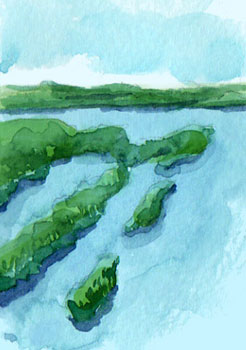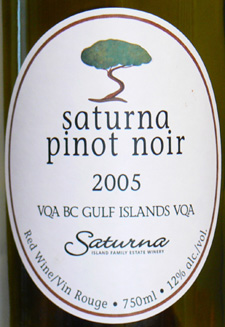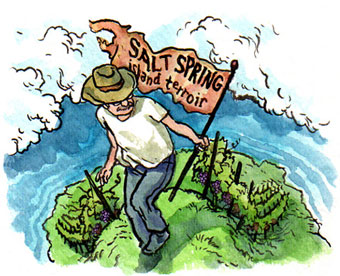

Further delineating the growing regions of the province, the British Columbia Wine Institute and the VQA have come up with the Gulf Islands appellation.
The Gulf Islands –
British Columbia’s Newest Appellation
A new Canadian appellation is welcomed silently and not without a little controversy as to its somewhat stealth like appearance.
by
John Schreiner
April 9, 2007
A previously unannounced wine appellation for British Columbia’s Gulf Islands region has just been disclosed through the release of Saturna Island's 2005 Pinot Noir, apparently the first wine to bear the appellation name on its label. [Editor’s note: click here to read John Schreiner’s review of Saturna Island's 2005 Pinot Noir]
Other significant producers in the new appellation were unaware of its existence until they were contacted recently by APPELLATION AMERICA.
This curious way of rolling out a new appellation reflects dysfunctional relationships within the British Columbia wine industry. When British Columbia wine regions were divided into appellations in the early 1990s, the definitions were primarily geographic: Okanagan, Similkameen, Fraser Valley and Vancouver Island, with an overarching British Columbia appellation for wines incorporating grapes from more than one appellation. Subsequent research by federal scientists has identified sub-regions in the Okanagan, reflecting that large appellation’s diversity. No effort has been made to define appropriate grape varieties for each appellation, nor is that contemplated in the foreseeable future.
Columbia appellation for wines incorporating grapes from more than one appellation. Subsequent research by federal scientists has identified sub-regions in the Okanagan, reflecting that large appellation’s diversity. No effort has been made to define appropriate grape varieties for each appellation, nor is that contemplated in the foreseeable future.
“When we were putting appellations together, there weren’t any [wineries] on Vancouver Island,” recalls Harry McWatters, the founder of Sumac Ridge Estate Winery and an industry leader. “We knew that there were grapes planted and we were just trying to accommodate the future.”
The first winery on Vancouver Island opened in 1992. Currently, there are 19 (plus a meadery and two cideries). A vineyard census last year identified 34 vineyards with 254 acres of vines on Vancouver Island, just four percent of British Columbia’s vineyards.
The new Gulf Islands appellation has 12 vineyards and 103 acres of vines scattered across half a dozen islands. Most of the wineries also buy, or have bought, grapes from the Okanagan and Similkameen appellations.
The Gulf Islands, a northern extension of the American San Juan Islands, are situated between Vancouver Island and the British Columbia mainland in the well-sheltered Strait of Georgia. The distance, as the crow flies, from Saturna in the south to Quadra Island at the likely northern limit of island viticulture is about 160 km.
Currently, there are six wineries scattered among the islands. Saturna Island Family Vineyards, which opened in 1998 and has a 60-acre vineyard, is the largest and the oldest continually operating winery on the islands.
Garry Oaks Winery and Salt Spring Vineyards opened in 2001 on Salt Spring Island (the largest of the Gulf Islands with a population of 10,000). Thetis Island Vineyards on Thetis Island and Marshwood Estate Winery on Quadra Island opened in 2004, followed by Morning Bay Farm on Pender Island in 2005 and Carbrea Vineyard on Hornby Island in 2006. Galiano Island Winery will open in the summer of 2007.
(Marshwood was sold in 2006 and the winery closed at the end of the year. However, another winery is under development on Quadra.)
“We dealt with it at the technical committee as more of a housekeeping thing,” McWatters says. “It was not a new appellation where they had to demonstrate that it was critically acclaimed as being distinctively different.”
His recollection is that some of the Gulf Island wineries did not want to be “lumped in” with Vancouver Island. Another source suggests that the impetus came from the British Columbia Ministry of Food and Agriculture as part of the ministry efforts (so far unsuccessful) to marshal support for wine standards incorporating the Vintners Quality Alliance. At least two Gulf Islands wineries backed VQA while most on Vancouver Island no longer participate in the VQA program and are not members of the BCWI.

The largest island in the Gulf Islands appellation
is Salt Spring Island whose terroir is typical
of the entire appellation.
It would appear that the BCWI communicated news of the new appellation just to its member wineries, with only Saturna Island so far taking advantage of it. Salt Spring Vineyards briefly interrupted its BCWI membership last year, but has since rejoined.
When that winery last summer released the first sparkling wine from the Gulf Islands – a bottle fermented Pinot Noir/Chardonnay blend called Karma – the wine was released as “Product of Canada” even though the back label suggests strongly that the grapes for the wine were grown on the island.
Elaine Kozak, the winemaker and co-owner of Garry Oaks, says she was not aware of the new appellation. Nor did Morning Bay’s Keith Watt know of it.
Watt is delighted with the appellation. “I believe that the wines of the Gulf Islands have their own unique character, different from Vancouver Island wines and Fraser Valley wines. The ocean breezes, the soils, and the long, cool Mediterranean climate interact to create wines that I believe will meet with great customer interest.”
Kozak is lukewarm. “I’d say offhand that a separate Gulf Island appellation is preferable to our being caught under the Vancouver Island one from a naming perspective. One could argue that our growing environment is different than, say, [Vancouver Island’s] Cowichan Valley but then so are the conditions in the Saanich Peninsula,” she says. “I’m not sure how we will use this appellation – unless compelled to in some way – as we find the “Salt Spring Island” locator more meaningful from an identity and marketing perspective.”
“It is my opinion that the [appellations] are being formed as a means of controlling what people do and grow in a region,” he says. “This has not worked in Ontario or in many other places in the world. In Canada, the powers that be, and the owners of the VQA mark are conspiring to control the small wineries and innovation. It is clea
Other significant producers in the new appellation were unaware of its existence until they were contacted recently by APPELLATION AMERICA.
This curious way of rolling out a new appellation reflects dysfunctional relationships within the British Columbia wine industry. When British Columbia wine regions were divided into appellations in the early 1990s, the definitions were primarily geographic: Okanagan, Similkameen, Fraser Valley and Vancouver Island, with an overarching British
 Columbia appellation for wines incorporating grapes from more than one appellation. Subsequent research by federal scientists has identified sub-regions in the Okanagan, reflecting that large appellation’s diversity. No effort has been made to define appropriate grape varieties for each appellation, nor is that contemplated in the foreseeable future.
Columbia appellation for wines incorporating grapes from more than one appellation. Subsequent research by federal scientists has identified sub-regions in the Okanagan, reflecting that large appellation’s diversity. No effort has been made to define appropriate grape varieties for each appellation, nor is that contemplated in the foreseeable future.
“When we were putting appellations together, there weren’t any [wineries] on Vancouver Island,” recalls Harry McWatters, the founder of Sumac Ridge Estate Winery and an industry leader. “We knew that there were grapes planted and we were just trying to accommodate the future.”
The first winery on Vancouver Island opened in 1992. Currently, there are 19 (plus a meadery and two cideries). A vineyard census last year identified 34 vineyards with 254 acres of vines on Vancouver Island, just four percent of British Columbia’s vineyards.
The new Gulf Islands appellation has 12 vineyards and 103 acres of vines scattered across half a dozen islands. Most of the wineries also buy, or have bought, grapes from the Okanagan and Similkameen appellations.
The Gulf Islands, a northern extension of the American San Juan Islands, are situated between Vancouver Island and the British Columbia mainland in the well-sheltered Strait of Georgia. The distance, as the crow flies, from Saturna in the south to Quadra Island at the likely northern limit of island viticulture is about 160 km.
Currently, there are six wineries scattered among the islands. Saturna Island Family Vineyards, which opened in 1998 and has a 60-acre vineyard, is the largest and the oldest continually operating winery on the islands.
Garry Oaks Winery and Salt Spring Vineyards opened in 2001 on Salt Spring Island (the largest of the Gulf Islands with a population of 10,000). Thetis Island Vineyards on Thetis Island and Marshwood Estate Winery on Quadra Island opened in 2004, followed by Morning Bay Farm on Pender Island in 2005 and Carbrea Vineyard on Hornby Island in 2006. Galiano Island Winery will open in the summer of 2007.
(Marshwood was sold in 2006 and the winery closed at the end of the year. However, another winery is under development on Quadra.)
The Appellation No One Really Knew About
The Gulf Islands appellation, although not unveiled until recently, was designated two years ago by the technical committee of the British Columbia Wine Institute (BCWI).“We dealt with it at the technical committee as more of a housekeeping thing,” McWatters says. “It was not a new appellation where they had to demonstrate that it was critically acclaimed as being distinctively different.”
His recollection is that some of the Gulf Island wineries did not want to be “lumped in” with Vancouver Island. Another source suggests that the impetus came from the British Columbia Ministry of Food and Agriculture as part of the ministry efforts (so far unsuccessful) to marshal support for wine standards incorporating the Vintners Quality Alliance. At least two Gulf Islands wineries backed VQA while most on Vancouver Island no longer participate in the VQA program and are not members of the BCWI.

The largest island in the Gulf Islands appellation
is Salt Spring Island whose terroir is typical
of the entire appellation.
When that winery last summer released the first sparkling wine from the Gulf Islands – a bottle fermented Pinot Noir/Chardonnay blend called Karma – the wine was released as “Product of Canada” even though the back label suggests strongly that the grapes for the wine were grown on the island.
Elaine Kozak, the winemaker and co-owner of Garry Oaks, says she was not aware of the new appellation. Nor did Morning Bay’s Keith Watt know of it.
Watt is delighted with the appellation. “I believe that the wines of the Gulf Islands have their own unique character, different from Vancouver Island wines and Fraser Valley wines. The ocean breezes, the soils, and the long, cool Mediterranean climate interact to create wines that I believe will meet with great customer interest.”
Kozak is lukewarm. “I’d say offhand that a separate Gulf Island appellation is preferable to our being caught under the Vancouver Island one from a naming perspective. One could argue that our growing environment is different than, say, [Vancouver Island’s] Cowichan Valley but then so are the conditions in the Saanich Peninsula,” she says. “I’m not sure how we will use this appellation – unless compelled to in some way – as we find the “Salt Spring Island” locator more meaningful from an identity and marketing perspective.”
A Government Conspiracy?
Paul Troop, the winemaker for Salt Spring Vineyards, is even suspicious of the motives behind the appellation, a suspicion that reflects the divisions in the British Columbia wine industry.“It is my opinion that the [appellations] are being formed as a means of controlling what people do and grow in a region,” he says. “This has not worked in Ontario or in many other places in the world. In Canada, the powers that be, and the owners of the VQA mark are conspiring to control the small wineries and innovation. It is clea










 READER FEEDBACK: To post your comments on this story,
READER FEEDBACK: To post your comments on this story,


